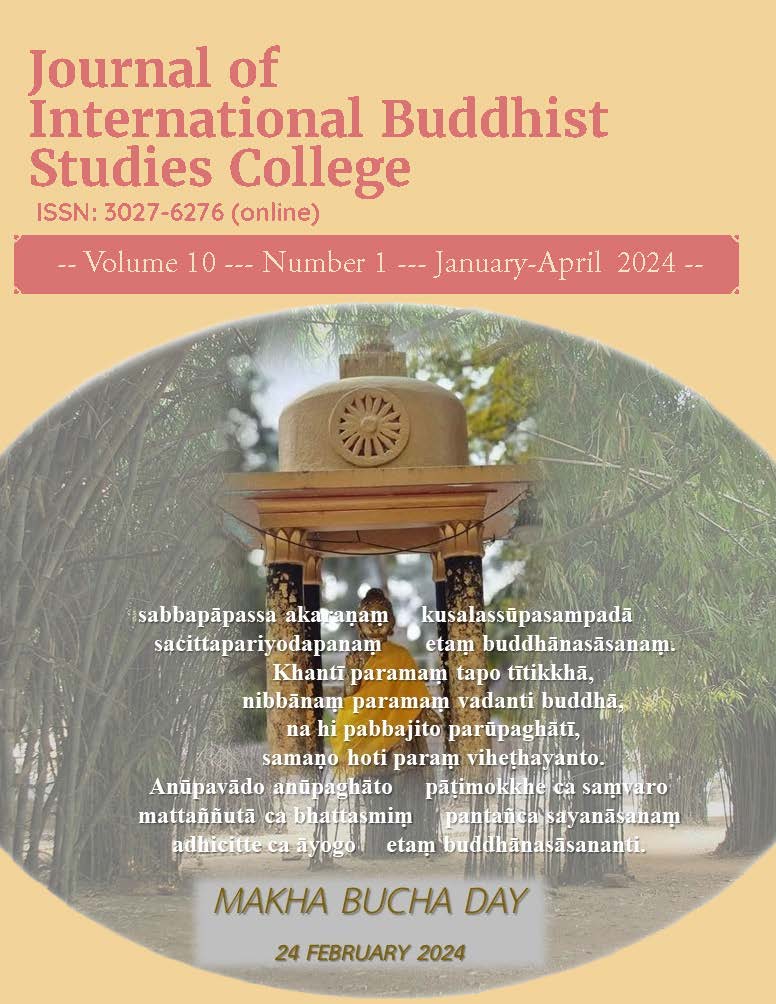The Process of Kamma Rectification for Sustainable Health and Longevity for Thai Buddhists
Main Article Content
Abstract
This research article has 3 objectives: 1) to analyze the problems and impacts of the notion of kamma rectification among Thai Buddhists, 2) to study the kamma rectification in Buddhist Scriptures which is related to health and longevity, 3) to propose the process of kamma rectification for sustainable health and longevity for Thai Buddhists. The research methodology of this dissertation-based article is documentary, in-depth interview research, and focus group discussion.
The findings show that Thai Buddhists commonly think “kamma” refers to bad actions from their past life that are giving bad consequences in this life. This is believed to lead to many illnesses and short life but this is not entirely correct according to the Buddhas’ teachings. The “kamma rectification” is a Thai Buddhists’ belief to amend the result of the kamma by accepting its existence and trying to improve the present-kamma that is believed to rectify the result of past life kamma. But in the Tipitaka is not (directly) mentioned at all. To begin the process of kamma rectification for sustainable health and longevity for Thai Buddhists, the kamma rectifier must first have a right view of the meaning of “kamma” and “kamma rectification.” Then start the general process of kamma rectification which helps minimize kamma result. It generally starts with realizing, letting go, and overcoming mistakes. Then, minimizing negative behaviors and their effects by engaging in positive deeds like generosity, abiding by precepts, and practicing Dhamma. The wise kamma rectifiers should also aim to reach extinguishment of kamma by following the Noble Eightfold Path which leads to no more rebirth and ultimately no more illness. The process of the kamma rectification for sustainable health and longevity is to follow the health promotion methods as it appeared in the Theravada Buddhist Scriptures.
Article Details
The Journal of TCI is licensed under a Creative Commons Attribution-NonCommercial-NoDerivatives 4.0 International (CC BY-NC-ND 4.0) licence unless otherwise stated. Please read our Policies page for more information on Open Access, copyright and permissions.
References
Anguttara Nikāya. (1934). [The Book of the Gradual Sayings (Anguttara-Nikāya) or more-numbered suttas]. (Hare, E.M., Trans.). Vol 3 (The Books of Fives and Sixes). PTS.
Bhikkhu Bodhi. (2000). The connected discourses of the Buddha.
Buddhaghosa, B. (2010). Visuddhimagga: Path of Purification. (Bhikkhu Ñāṇamoli, Trans) Buddhist Publication Society.
Chonsawad, Viravat. (2013) The True Buddhist Rectify Kamma with Good Dhamma. Nonthaburi: Green Wisdom.
Kapur, R. (2022, February 13). The Secrets of Longevity. Online Article. https://www. researchgate.net/publication/323825327_The_Secrets_of_Longevity
Majjhima Nikāya (1995) [The middle length Discourse of the Buddha]. (Bhikkhu Ñāṇamoli and Bhikkhu Bodhi, Trans). PTS.
Payutto, P.A. (1982). Buddha Dhamma. Dhamma Council of Chulalongkorn University.
Payutto, P.A. (2013). Believe Kamma, Know Kamma, Rectify Kamma. Dhamma Council.
Payutto, P.A. (2016) Dictionary of Buddhism. Peace Studies Foundation.
Phra Vijit Dhammajito. (2011). Sāsana Dhamma and Health. Public Health and Development Foundation.
Phrakhru Prachak Sirivaṇṇo. (2009). What Do You Think of The Word “Kamma”. Confirm Ltd.
Phrakhru Suttaphatthanaphon, Phra Vimarn Khamphirapanno and Suanmafai, P. (2020) Approach of Health Promotion in Buddhism in Accordance with Theravada Buddhist Approach. Journal of Graduate Saket Review. 5(1), 57-68.
Punjasunthorn, K., Onma, S. and Yongphet, B. (2018). Kamma Rectification in Theravada Buddhist Philosophy. Journal of Humanities and Social Sciences Burapa university. 26(51), 342-361.
Ratanasuwan, P.. (1996). Sound of Heaven. vol. 3. Spirit.
Saṃyutta Nikāya. (2000) [The Connected Discourses of the Buddha]. (Bhikkhu Bodhi, Trans). vol 1. PTS.
Saṃyutta Nikāya. (2000) [The Connected Discourses of the Buddha]. (Bhikkhu Bodhi, Trans). vol 2. PTS.


